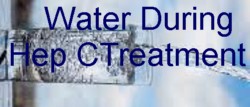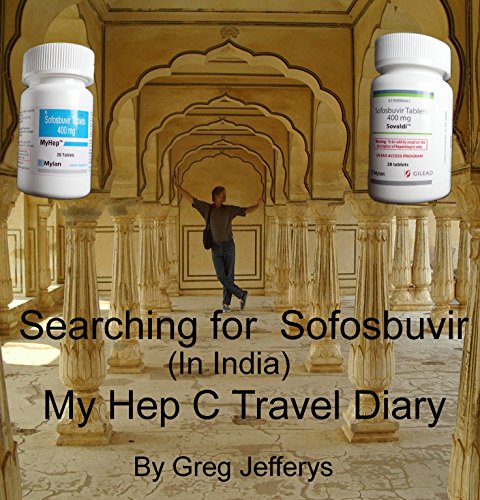Hepatitis C Blog
Greg Jefferys Hepatitis C blog deals with all the issues associated with hepatitis C
How Much water to drink during Hep C treatment
- October 13, 2022
- By Greg Jefferys
- 2 Comments
How Much Water Should I Drink During Hep C Treatment
Here is the thing… there is a lot of mythology about how much water you should drink.
In my Hepatitis C Facebook group well meaning people often recommend drinking “tons of water” during Hep C treatment, but this is not a healthy, or safe, suggestion. Drinking too much water can lead to serious illness and even death.
When you drink too much water, your kidneys can’t get rid of the excess water. The sodium content of your blood becomes diluted. This is called hyponatremia and it can be life-threatening.
Drinking too much water is just as much of a problem as not enough water!
How Much Water Should I Drink?
So how much water should you drink during Hepatitis C treatment?
Firstly you need to understand that there is no simple, magic formula to determine how much water you should drink daily, everyone is different.
Let me explain this further. If you Google “How much water should I drink?” you will come across something like this statement:
“Here is a simple formula to calculate approximately how much you should drink. Take your weight and divide it by 2, which for me means 60-70 ounces of water per day.”
But this is actually not true.
Because if you live in a cold climate your water needs will be lower. If you live in a hot climate they will be higher. If you are doing a lot of physical work your water needs will be higher. If you eat a lot of salty foods your water needs will be higher. If your body weight is 120 kilograms you will need more water than a person who weighs 50 kilograms and visa versa.
All the body’s cells need water to function well. The problem arises when you drink too much water, which is called overhydration.
There’s no single formula to determine how much water you should drink daily. The popular recommendation of about eight glasses a day is a good starting point. You should adjust your intake around this amount depending on your environment, exercise regimen, overall health, and conditions like pregnancy or breastfeeding.
Water, not soda, not tea, not coffee, not Gatorade, not Beer
When people felt thirsty a couple of thousand years ago they drank water. Water is what your body wants when it says to you “I am thirsty.”
But today we go to the shop and buy a can of Coke or a fruit juice or a carton of milk and trick our body into thinking it has had water.
Processed fluids are not water. Water is H2O, two atoms of Hydrogen and one atom of Oxygen. As soon as you add something to water and drink it, it no longer performs the function that water is intended for. Its not water if you add something to it. Indeed most processed drinks, such as tea, coffee, beer, soda etc, have the opposite effect of water.
So while you are doing Hep C treatment, the thing is to cut out processed drinks, particularly those that have sugar or sugar substitutes and other rubbish added to them. Just drink water when you are thirsty.
If people drink sweet aerated drinks (fizzy drinks) like Coke or such. Or they drink so-called ” energy drinks” with caffeine and taurine and such, it really screws with your kidneys and your natural sense for when you need to have a drink of water.
If you drink just water, not milk or other processed drinks, your body will tell you when you are thirsty.
There is no set amount of water to drink each day. It depends on so many factors. Is it a hot day? Cold day? Humid? Dry? Have you sweated a lot?
So drink water when you are thirsty.
Thirst is the natural way to determine your water intake
Thirst is the brain’s way of warning that you’re dehydrated and you need to drink some water. But excessive and persistent thirst (known as polydipsia) could be a sign of an underlying problem such as diabetes.
Thirst is a subjective perception that provides the urge for humans and animals to drink fluids. In the natural world this means to drink water. However in the modern world our thirst is confused by advertising and marketing and the availablity of many liquids that can be drunk.
Remember that the real function of thirst is to get you to drink WATER. Not tea, not beer etc, etc. Thirst is a component of the regulatory mechanisms that maintain body fluids at the most correct level. This process is called homeostasis and ultimately is essential for survival
How can you tell if you are drinking too much water?
One of the best ways to determine if you’re drinking enough water is to monitor the colour of your urine. Healthy urine usually ranges from pale yellow to tea-coloured due to the combination of the pigment urochrome and the water level in your body. If your pee is often clear, that’s a sure sign you’re drinking too much water in a short span
- Post Categories
- Uncategorized
Greg Jefferys
2 Comments
Leave a Comment Cancel Reply
Join my Hep C Support Group.
Talk privately to other people
with Hep C in a closed group.
Disclaimer
Greg Jefferys’ blog is provided for informational purposes and is not intended as Medical advice, diagnosis, or treatment.
Whilst Greg Jefferys is doing a PhD it is not in medicine. Any advice offered is offered in good faith and based on an extensive general knowledge of Hepatitis C and access to generic Hepatitis medicines Greg Jefferys has acquired through his work as an advocate and activist
The Hep C Buyers Club is not a company or corporate entity but simply a loose structure intended to offer a free information to people with Hepatitis C
Other Books
Click here for other books by Greg Jefferys.
for Kindle
I have converted this diary into a kindle book for folk who might like it in that format. I have added a lot more depth than the original diary contains, it’s more of a complete story in book format. I have priced it as low as Kindle allows me to @ 99 cents. If you are interested just click here to go to the Kindle page.
Recent Posts
-
Hepatitis C Treatment and Liver Cancer June 19, 2024
-
Motivate C a Profitable Hep C Initiative April 29, 2024
-
After Hep C Healthy Liver Diet September 4, 2023
-
Fear of Hep C Treatment April 14, 2023
-
My Letter to Joe Biden March 2, 2023
-
Dormant Hepatitis C November 27, 2022
-
How Much water to drink during Hep C treatment October 13, 2022
-
Hep C and Peripheral Neuropathy August 21, 2022
-
Fatigue Brain Fog and Hepatitis C August 18, 2022
-
Hep C and Liver Cancer May 18, 2022
Contact Us
If you have any questions please reach out by email, or complete the below form.
Greg Jefferys3439 Channel Highway, Woodbridge, Tasmania, 7161.
Email: gregjefferys@outlook.com




Greg Jeffreys is my hero. He really cares about people and has helped my son get the medication he needed to cure Hep C. He is always available to answer any questions and so patient and kind. I recommend his Buyers Club for anyone who needs medication for Hep C and can’t afford it in the U.S,
[…] Hydrated: Drink plenty of water to support overall health and help flush toxins from the body. Click this link to get more information on how much water to drink. Drinking too much water can be just as damaging as not enough […]